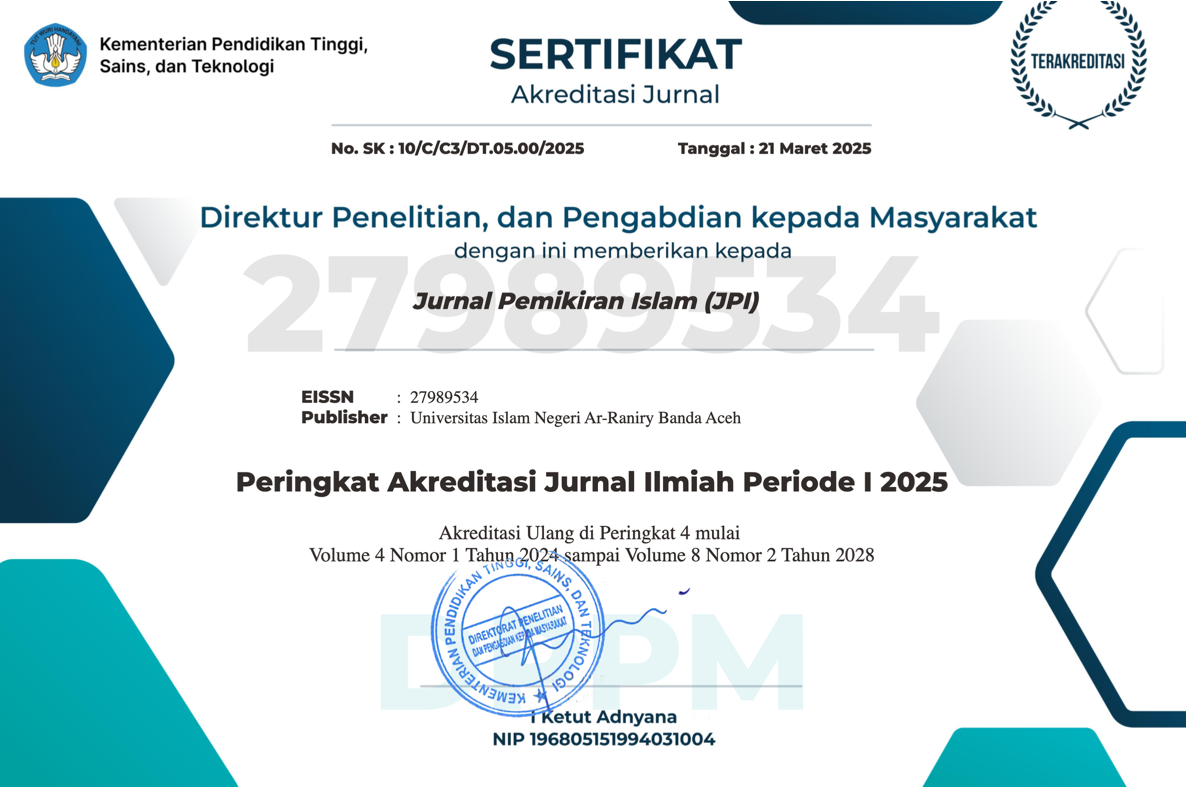Kritisasi Anakronisme Arkoun terhadap Keislaman dan Kemodernan
DOI:
https://doi.org/10.22373/jpi.v3i2.22473Keywords:
anakronisme, Keislaman, KemodernanAbstract
Arkoun tried to suggest or introduce anachronistic as the beginning of the new Islamic model era. The representative Arab world of Islam does not recognize the world of anachronisms to accept the presence of the activities and creativity of modernity today. The essence of modernity is in fact necessary only in the methodology of open-minded Islamic societies, not converting Muslims to the Islamic worldview. Rethinking, reconstruction and renewal in the modern era are regarded as Islamic opposition due to the application of anachronisms changing the new order of Islam. Anachronism aims to devour Islamic turats (Islamic traditions) but is trapped in Islamic criticism. Islam Kaffah (Islamic perfectionist) will be brought into Islam al-yassar (Islamic Left). An anachronistic deliberation of the approaches used in the past issue of excavation of legal finalization will change according to modernity. Anachronism have been placed modernity as the creation of the advancement of all sides of human life with unlimited activities, creativity and ethos.
Abstrak
Arkoun mencoba mensugestikan atau memperkenalkan anakronistik sebagai dimulainya era model Islam baru. Dunia Arab yang representatif Islam tidak mengenal adanya dunia anakronisme untuk menerima kehadiran aktifitas dan kreatifitas modernitas sekarang. Essensi modernitas sejatinya dibutuhkan hanya dalam metodologi membuka akal masyarakat Islam, bukan mengubah Muslim terhadap worldview Islam. Rethinking, rekonstruction dan renewal di era modern dianggap sebagai oposisi Islam akibat aplikasi anakronisme merubah tatanan baru keIslaman. Anakronisme bertujuan membaguskan turats Islam (tradisi Islam) namun terjebak dalam kritik Islam. Islam kaffah akan digiring ke dalam Islam al-yassar (Islam Kiri). Delibrasi anakronistik terhadap pendekatan-pendekatan yang digunakan pada masalah lalu tersebut tentang penggalian finalisasi hukum akan berubah sesuai modernitas. Anakronisme menempatkan modernitas sebagai penciptaan kemajuan semua sisi kehidupan manusia dengan berbagai aktifitas, kreatifitas dan ethos yang tanpa batas.
Downloads
References
Ali, M. M. (2010). English Translation of The Holy Qur’an: With Explanatory Note, ed. Zahid Azis. Ahmadiyya Anjuman Lahore Publications.
Anjum, O. (2008). Reason and Politics in Medieval Islamic Thought: The Taymiyyan Moment. University of Winsconsin.
Arjomand, S. A. (2013). Social Theory and Regional Studies in The Global Age. State University of New York.
Arkoun, M. (1994). Rethinking Islam: Common Question, Uncommon Answers, trans. Robert D. Lee. Westview Press.
Arkoun, M. (2002). The Unthought in Contemporary Islamic Thought. Saqi Books.
Arkoun, M. (2006). Islam: To Reform or to Subvert? Saqi Books.
Averroës. (1961). On The Harmony Of Religion And Philosophy: A Translation, trans. George F. Hourani. Luzac.
Baderin, M. A. (2017). Islamic Law in Practice. Routledge. https://doi.org/10.4324/9781315251738
Bielefeldt, M. L. P. L. dan H. (2016). Human Rights and Religion in Educational Contexts. Springer International Publishing.
Demirci, E. Y. (2008). Modernisation, Religion and Politics in Turkey: The Case of the İskenderpaşa Community. Insan.
Esmail, A. F.-A. dan A. (n.d.). The Construction of Belief: Reflection on the Thought of Mohammed Arkoun. Saqi Books.
Gavin W. Jones et. al. (2009). Muslim Non Muslim Marriage: Political and Cultural Contestations in Southeast Asia. Institute of Southeast Asian Studies.
Gleave, R. (2012). Islam and Literalism: Literal Meaning and Interpretation in Islamic Legal Theory. Edinburgh University Press.
Hallaq, W. B. (1997). A History of Islamic Legal Theories: An Introduction to Sunni Usul Al-Fiqh. Cambridge University Press.
Hilāl, A. al-D. (1982). Islamic Resurgence in The Arab World. Greenwood Publishing.
ʻAshshī, A. K. (1999). The Meaning of the Glorious Qurʼan: Text and Explanatory Translation, Amana Publications. MD: Amana Publications.
Kepel, G. (2005). The Roots of Radical Islam. Saqi Books.
Körner, F. (2005). Revisionist Koran Hermeneutics in Contemporary Turkish University Theology: Rethinking Islam. Ergon.
Küng, H. (2007). Islam: Past, Present and Future. Oneworld.
Leaman, S. H. N. dan O. (1996). History of Islamic Philosophy. Routledge.
Lueg, J. H. dan A. (1995). The Next Threat: Western Perceptions of Islam. Pluto Press.
Marohomsalic, N. A. (2001). Aristocrats of The Malay Race: A Historic of The Bangsa Moro in The Philippines. N.A. Marohomsalic.
Mattson, I. (2008). The Story of The Qur’an: Its History and Place in Muslim Life. Blackwell Pubilcation.
Maudoodi, S. A. ‘Ala. (1989). The Meaning of The Qurān: Surah al-Kahf al-Hajj. Islamic Publications.
Mills, R. L. dan S. (2003). Feminist Postcolonial Theory: A Reader. Routledge.
Mozaffari, M. (1987). Authority in Islam: From Muhammad to Khomeini. M. E Sharpe.
Muller, M.-L. F. dan A. T. (2013). Islam and International Law: Engaging Self-Centrism From a Plurality of Perspectives. Martinus Nijhoff Publishes.
Murād, S. ʻAlī. (2006). Early Islam Between Myth and History: Al-Ḥaṣan Al-Baṣrī (d. 110H/728CE) and The Formation of His Legacy in Classical Islamic Scholarship. Brill.
Murphy, C. (2002). Passion for Islam,: Shaping The Modern Middle East: The Egyptian Experience. Scribner.
Najmabadi, S. J. dan A. (2003). Encyclopedia of Women and Islamic Cultures: Methodologies, Paradigms and Sources. Brill.
Netton, I. R. (2008). Encyclopedia of Islam. Routledge.
Noorani, A. G. A. M. (2002). Islam and Jihad. LeftWord Books.
Ozoliņš, J. T. (2016). Religion and Culture in Dialogue: East and West Perspectives. Springer International Publishing.
Paraskeva, J. M. (2011). Conflict in Curriculum Theory: Challenging Hegemonic Epistemologies. Palgrave Mac Millan.
Paterson, I. (2009). The God, of The Machine. Transaction Publishers.
Prep, K. T. (2017). Gre Prep Plus 2018. Kaplan Publishing.
Ramakant et. al. (2021). Contemporary Pakistan: Trends and Issues. Kalinga Publications.
Rippin, A. (1988). Approaches to The History of The Interpretation of The Qur’an. Clarendon Press.
Rithven, M. (2004). A Fury for God: The Islamist Attack on America. Granta Books.
Serageldin, I. (1994). Mirrors and Windows. American Journal of Islam and Society, 11(1), 79–107. https://doi.org/10.35632/ajis.v11i1.2456
Shabana, A. (2010). Custom in Islamic Law and Legal Theory: The Development of the Concepts of ‘Urf and ‘Adah in The Islamic Legal Tradition. Palgrave Macmillan.
Shah, M. (2010). The Hạdīth: Scholarship, Perspectives, And Criticism. Routledge.
Stauffacher, M. E. H. N. M. dan W. (2010). Truth in Science, The Humanities and Religion: Balzan Symposium 2008. Springer Sciense+Bussiness Media.
Steel, N. J. M. dan S. (2018). Great Debates in Jurisprudence. Palgrave.
Stiles, D. (2001). The Successor. iUniverse.
Taji-Farouki, S. (1994). Islamic Discourse and Modern Political Methods. American Journal of Islam and Society, 11(3), 365–393. https://doi.org/10.35632/ajis.v11i3.2416
Versteegh, K. (1995). The Explanation of Linguistic Causes: Az-Zaggagi’s Theory of Grammer Introduction, Translation Commentary. John Benjamins Publishing.
Weeramantry, C. G. (1988). Islamic Jurisprudence: An International Perspective. Palgrave Mac Millan.
Downloads
Published
Issue
Section
License
Authors who publish in Jurnal Pemikiran Islam agree to the following terms:
- Authors retain copyright and grant the journal right of first publication with the work simultaneously licensed Attribution-NonCommercial-ShareAlike 4.0 International (CC BY-NC-SA 4.0) that allows others to share the work with an acknowledgment of the work's authorship and initial publication in this journal.
- Authors are able to enter into separate, additional contractual arrangements for the non-exclusive distribution of the journal's published version of the work (e.g., post it to an institutional repository or publish it in a book), with an acknowledgment of its initial publication in this journal.
- Authors are permitted and encouraged to post their work online (e.g., in institutional repositories or on their website) prior to and during the submission process, as it can lead to productive exchanges, as well as earlier and greater citation of published work. (See The Effect of Open Acces)














